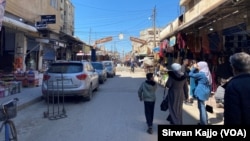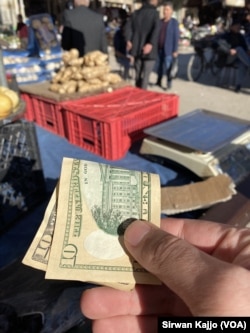In an economy largely shattered by a 13-year conflict, most business owners and shopkeepers in northeast Syria would be content to receive a few customers each day. But it would certainly make them happier if such customers paid in U.S. dollars.
"If you don’t have Syrian money, no problem, I take any U.S. dollar bill you have," a teenage fruit vendor in the Kurdish-majority city of Qamishli told VOA as he was trying to sell his produce.
"If you buy these strawberries, I’ll take that $10 bill and can give you back the change in Syrian money," added the boy, who didn’t give his name.
In this part of the region, the Syrian pound has seen an unprecedented decline over the past decade. The deteriorating currency is one of the many economic consequences of a civil war that has been raging since 2011.
As of April 4, the exchange rate for one U.S. dollar against the Syrian pound in the black market in Qamishli stood at 14,000. Before the war started, one U.S. dollar was worth about 50 Syrian pounds.
"With such a declining state of the Syrian pound, U.S. dollar has become an alternative currency in northeast Syria," said Mohammed Hafeed Khalil, who lectures on economics and accounting at the University of Rojava in Qamishli.
"U.S. dollar is now the de facto currency that has contributed to stabilizing the local economy here," he told VOA. "In a place where hyperinflation has been shaping the economy for some years, everyone would be happy to carry out their transactions in U.S. dollars, whether it’s large business owners, shopkeepers, street vendors or local customers."
A grocery owner in the covered market in Qamishli, who goes by the name Bave Ciwan, said the use of dollars in daily transactions is convenient.
"We buy our goods in dollars, so it’s only natural to sell in dollars as well," he told VOA, adding that "the exchange rate of the Syrian lira [or pound] changes literally every day, so sometimes it makes no sense to sell in Syrian money."
The grocer said that while not every customer has dollars, most shopkeepers would rather conduct their business in the U.S. currency, "because that way we don’t have to keep increasing our prices with each change in the exchange rate."
Northeast Syria is mostly under the control of the Syrian Democratic Forces, or SDF, a Kurdish-led military alliance that has been a major U.S. partner in the fight against the Islamic State terror group. An SDF-affiliated autonomous administration has been governing the region since 2012 after Syrian government troops withdrew to fight rebel forces elsewhere in the country.
While most of the Kurdish-controlled region is politically and militarily outside the control of the government of Syrian President Bashar al-Assad, its economy remains largely tied to that of the central government, particularly when it comes to monetary matters.
"As an autonomous administration, we don't have a policy to dollarize the economy, because we're part of Syria," said Hadiya Ali, co-chair of the economy and agriculture board at the Autonomous Administration of North and East of Syria.
"However, we have realized that using dollars in the market actually helps the local population in these difficult times and stabilizes the economy of northeast Syria. So while we don't have a policy of adopting the U.S. dollar as a unit of money, we have no restrictions on the use of U.S. dollars in the market as long as it contributes to economic stability in our region," Ali said.
Khalil also said the steady flow of U.S. dollars into northeast Syria has liberated and revitalized the local economy compared with other parts of Syria.
"While a formal dollarization in the northeast may not currently be possible, the abundance of U.S. dollar bills here represents a sharp contrast with the situation in Syrian government-controlled areas where the use of dollar is prohibited by law," he said. "This gives an economic edge to northeast Syria as the country remains under sanctions imposed on the government by the West."
Western governments, including the United States, have imposed major economic sanctions against the Assad government for its crackdown on peaceful protesters and crimes committed against civilians.
More than 90% of Syria’s population lives in poverty, according to a U.N. report released in March.
This story originated in VOA’s Kurdish Service.





